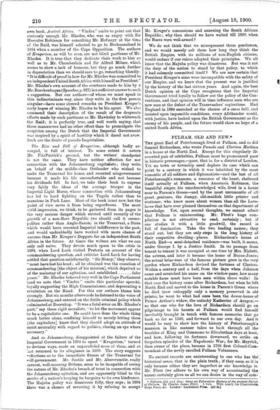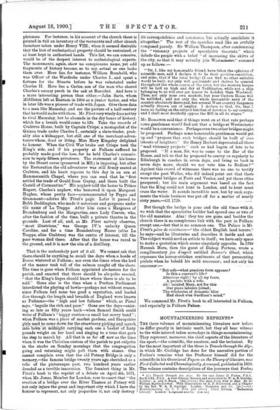FULHAM, OLD AND NEW
THE great Earl of Peterborough lived at Fulham, and so did Samuel Richardson, who wrote Pamela and Clarissa HarlOwe in a house at the North End. Except for this singularly ill- assorted pair of celebrities, Fulham must be pronounced poor in historic personages,—poor, that is, for a district of London. Yet no town or township need deplore its case which -can point to a century in which it was inhabited by the most romantic of all soldiers and diplotaatists—and the last of all Peterborough's romances, a romance of the heart, sheltered itself actually at Fulham, when Anastasia Robinson, the_ beautiful singer, his unacknowledged wife, lived in a house- near to Parson's Green—and by the most unromantic of all -- great geniuses, the dumpy, old-maidish little printer and stationer, who knew more about women than all the Love- laces that have ever plumed themselves on that department of knowledge. Yet, upon second thoughts, we cannot admit that Fulham is uninteresting. Mr. Feret's huge com- pilation is not attractive to read, certainly ; but if one studies it with a little goodwill, the record is full of fascination. Take the two leading names; they stand out, but they are only steps in the long history of • their respective dwelling - places. Richardson's house at North End—a semi-detached residence—was built, it seems, under George I. by a Justice Smith. In its passage from tenant to tenant it was occupied at one time by Mrs. Nisbett, the actress, and later it became the home of Bume-Jones ; the actual briar-rose of the famous picture grew in the very garden where Richardson devised the fortunes of Clarissa. Within a century and a half, from the days when Johnson came and scratched his name on the window-pane, how many notable faces must have been seen within those walls! In that case the history came after Richardson, but when he left . North End and moved to the house in Parson's Green where lie died (now unhappily only a memory preserved in old prints), he went to what had once been the dower-house of Prince Arthur's widow, the unlucky Katherine of Aragon,— so that one who for the love of Richardson should go on pilgrimage to his haunts at Fulham would find himself inevitably brought in touch with famous memories that go back so far as 1500, and forward to our own day. And it would be easy to show how the history of Peterborough's mansion in like manner takes us back through all the troubles of King and Commons to Elizabethan days at least, and how, following its fortunes downward, we strike on forgotten episodes of the Napoleonic War; for Mr. Meyrick, ' then owner of the place, became in 1798 first Colonel-Com- mandant of the newly enrolled Fulham Volunteers.
No ancient records are uninteresting to one who hasthe... historical sense, that is the plain truth ; if they seem so it ie only because either they are imperfect or our knowledge is. Mr. Feret (we adhere to his own way of accentuating the name) certainly gives us all we can desire in the way-of corn: • Fulham, Old and New: being an Exhaustive History o/ the Ancient Parish of Fulham. By Charles James Feret. 3 vols. With nearly GOO Illustrations, Maps, Plans, Sce. London : Leadenhall Press. [53 32.1
pleteness. For instance, in his account of the church there is
printed in full an inventory of the and other church furniture taken under Henry VDT.; when it seemed desirable thatthe loot of ecclesiastical property should be restrained, or at least kept in authorised hands. This list, we can conceive, would be of the deepest interest to eeclesiologicill experts. The monuments; again, show no conspicuous name, yet odd fragments of history become, so to say, actual as one looks the& over.- Here lies, for instance, William Rumbold, Who was Officer of the Wardrobe under Charles I., and spent a fortune for the Stuarts before he was reinstated under Charles II. Here lies a Carlos, son of the man who shared Charles's uneasy perch in the oak. at Boscobel. And here is a more interesting person than either,—John Saris, whom Middleton left at Bantaiii• in 1604-as a junior factor, and in later life was a pioneer of trade with Japan. Give those data to a man like Macaulay, and see the picture of a half-century that he would make with them. Mr. Feret very wisely does nottry to rival Macaulay, but he abounds in the dry bones of history, which for a breath would come to life. Take the records of Crabtree-House, built' by Captain Crisps; a monopolist of the Guinea trade under Charles I., certainly a slave-trader, prob- ably also a kidnapper, but still one of the merchant-adven- turers whom, dead or living; Miss Mary Kingsley delighted to honour. When the CiVil War broke out Crispe took the King's side, and if his property -at Fulham suffered he probably made good the loss, for he held Charles's commis- sion to equip-fifteen privateers. The statement- of his losses by the Stuart cause (preeerved . in MS.) is imposing, but after the Restoration the old adventurer was still firmly seated at Crabtree, and his heart reposes to this day in an urn at Hammersmith Chapel, where you can read that he " first settled the trade of Gould from Guyny, and there built the Castel' of Cormantine." -His itepheer-Soldthe-licitieeto Prince Rupert, Charles's nephew, who bestowed it upon Margaret Hughes, whose pretty face—commemorated by Pepys and Grammont—adorns Mr. 'Fetes -page: 'Later it passed to Bubb Doddington, who made it' notorious and gorgeous under the mine Of La" Trappe.. After him came a Margrave of Brandenburg and the Margravine,.once Lady Craven, who, after the fashion of the time, built a private theatre in the grounds. Last • of all, and, as Mr. Feret naively observes, "most illustrious," was George IV.'s unlucky Queen Caroline, and for a time Brandenburg House (alias La Trappe, alias Crabtree) was the centre of interest, till the poor woman died there. After that the house was razed to the ground, and it is now the site of a distillery. - _ .
That is the melancholy part of it all. We cannot ask that thaw:Ionia be anything_to.recall. the-days-when -a horde of Danes wintered at Fulham; nor even the times when the lord of the manor took toll of the salmon caught off the shore. The time is gone when Fulham appointed ale-tasters for the parish, and enacted that there should be ale-Poles erected, " that the King's lieges Should knoW where there is ale to be sold." Gone also is the- time. when a Puritan Parliament interdicted the playing of bowls—perhaps not without reason, since Fulham hid none too good a reputation, and loaded dice through the length and breadth' of England were known as Fulhiuns—the " high and low fulloms " which, as Pistol says, "beguile the rich and poor." • -Gone are the days—exist- ing so late as fifty years back—when Samuel Smith could write of Fulham's " happy rustics—a small but merry band " ; when Fulham was a place of market gardens, and Shropshire girls used to come down for the strawberry nicking and march into leiniitialibiight carrying each one a basket of forty pounds weight on her head and singing to a tune that gave the step to march by. All that is as far off now as the time when it was the Christian custom of the parish to put culprits in the stocks on Sunday mornings that the congregation going and returning might pelt them with stones, One cannot complain even that the old Putney Bridge is only a memory,—the famous.bridge twenty years ago cherished as a relic of the picturesque past, two hundred years earlier dreaded as a terrible innovation. The funniest thing in Mr. Feret'e book is the reprint of a debate on April 4th, 1671, when Mr. Jones, Member for London, rose to assert that " the erection of a bridge over the River Thames . at Putney will not-only injure the great and important city which I have the honour to represent, not only jeopardise it, not only destroy its correspoidenee and commerce, but actually annihilate it altogether." The rest of the speeches read like an artfully Composed parody. Sir William Thompson, after condemning the " visionary projects of speculative theorists," which
delude the people with a belief " of increasing the skirts of the city, so that it may actually join Westminster," summed up as follows :—
." Sir, I, like my honourable friend, have taken the opinions of scientific men, and I declare it to be their positive conviction, and mine, that if the fatal bridg-4 (I can find no other suitable word) be built, not only will quicksands and shelves be created throughout the whole course of the river, but the western barges will be laid up high and dry at Teddington, while not a ship belonging to us will ever get nearer to London than Woolwich. Thus, not only your own markets, but your Custom House will be nullified ; and not only the whole mercantile navy of the country absolutely:destroyed, but several West-country bargemen actually thrown out of employ. I declare to God, Sir, that I have no feeling on the subject but that of devotion to my country, and I shall most decidedly oppose the Bill in all its stages."
Mr. Boscawen said that if things went on at that rate perhaps some gentleman would find out that a bridge at Westminster would be a. convenience. Perhaps even two other bridges might be proposed. Perhaps some honourable gentleman would get up and " propose that such bridges should be built of iron (shouts of laughter)." Sir Henry Herbert deprecated all these " mad visionary projects " such as had begun of late to be proposed. If a man, Sir, was to come to the Bar of the House, and tell us that he proposed to convey us regularly to Edinburgh in coaches in seven days, and bring us back in seven days more, should we not vote him to Bedlam ? "
Against this crowd of witnesses there was no one to testify except the poet Waller, who did indeed point out that there were several bridges at Paris and Venice, and yet those cities prospered; but his main argument was based on the fact that the King could not hunt in London, and to hunt must cross the water. It sounds incredible now, but by such argu.
meats the whole business was put off for a matter of nearly sixty_ years,—till /729.
But though the bridge .is gone and the old times with it, we wish that the speculative builder had spared one or two of
the old mansions. Alas ! they too are gone; and besides the church there is no conspicuous link with the past in Fulham except one,—but that is no common one. The Palace is Mr.
Fbret's piece de resistance—" the oldest English land tenure," he says—and he illustrates and describes it inside and out. The subject would need an article to itself ; we have only space to make a quotation which seems singularly apposite. In 1789 Hannah More, then the guest of Bishop Porteus, wrote a complimentary jeu d' esprit entitled Bonner's Ghost, which expresses the horror-stricken sentiments, of that persecuting prelate when he beheld his mild successor; and not only his successor :— " But soft—what gracious form appears • • - •
Is this a convent's life ?
Atrocious sight ! by all my fears, A prelate with a wife. Alt.! sainted Mary, not for this Our pious labours joined; The witcheries of domestic bliss Had shook e'en Gardiner's mind."
We commend Mr. Fbret's book to all interested in Fulham, and especially in Fulham Fale.oe.-



































 Previous page
Previous page